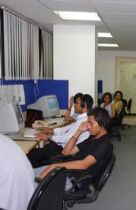BPOs located in rural areas and tier 2 and 3 cities are expected to drive the growth of the Indian BPO sector in coming years, experts said on Wednesday.
 "The domestic market is growing", Nasscom President Som Mittal told reporters during the BPO Strategy Summit which began here on Wednesday.
"The domestic market is growing", Nasscom President Som Mittal told reporters during the BPO Strategy Summit which began here on Wednesday.
These rural BPOs will not have a focus on accent or on English like their counterparts in urban areas, or those dealing with international clients. It will look at servicing local clients in the local language.
However, power and infrastructure will be essential to ensure the growth of these BPOs. The state governments will be called upon to play a role in helping the rural BPO sector grow, he said.
Indian state governments will compete for projects, said Nasscom BPO Chairman Vikram Talwar.
He noted that Karnataka had already announced it would set up 100 rural BPOs after sensing the potential.
Similar initiatives were being taken up elsewhere. "The growth in rural BPOs will happen, but it will take time," he said, adding that currently it was at a very nascent stage.
Rural entry is expected to drive the domestic growth. According to global solutions provider Aditya Birla Minacs Worldwide President-Asia Pacific Milind Godbole, availability of trained manpower and infrastructure was important.
There was also a need to change the 9 am to 5 pm work culture mindset. His firm has adopted the hub and spoke model, whereby the hub would be in a bigger city and the spokes in rural areas or smaller towns.
Work would be broken up into various processes and some part of it would be given to these rural BPOs.
Technology and control would lie with the hub while the spokes would have lesser seats and less complex work which could be completed with the available manpower.
Each of these hubs spread over various regions would handle four languages in each region. They were also imparting training to employees at the spokes level and investing in them to ensure success of the India connect model, he said.








 © 2025
© 2025